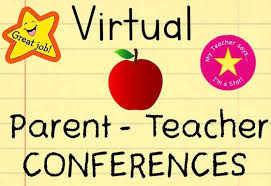Administrators Adjust Parent-Teacher Conferences to Reflect a Virtual Environment

November 29, 2020
Mid-first semester parent-teacher conferences on Oct. 21, 26 and 30 were adapted by Associate Principal Kyle Popp for the virtual world in the N.J.S.D. because of COVID-19.
The adjustments Popp, alongside other administrators made, broke conferences down into two, four-hour long sessions, and one three-hour session, providing parents 10 minutes with each teacher, Popp informed.
This was likely quite mentally draining for many teachers; 30 teachers were booked for each slot, and full-time teachers were booked for almost every appointment, even though virtual attendance was similar to in-person, somewhere between 35 and 45 percent, according to Popp. This will potentially be solved before the next set of conferences, currently scheduled for March 3, 8 and 12.
Popp sees this as an important change.
“They were able to have more personal conversations because they weren’t in a crowded gym and worried about the person next to them hearing about their student,” he said.
Parents were clearly appreciative. Brian Piechocki, a parent who attended the virtual conferences, said that “since it was only 10 minutes, it was easier to get straight to the point.”
Popp also shared the results of a survey to parents, which asked the question: ‘In the future, would they prefer a virtual or an in-person conference?’ About 85 percent said they preferred virtual. This means that in the future, virtual conferences may continue even without COVID. This shows that parents of children in Neenah, are looking to build better, more personal relationships with their children’s teachers, and improve their educational opportunities and success.
He spoke more about why conferences are salient, going further than just the logistical simplifications, regarding the importance of parents meeting with their children’s teachers, and being able to see that those teachers really care about their children. This is key, so that parents can be a part of their student’s learning.
He is backed up by researchers as well. Jeremy Monk at the Samuel Center for Social Connectedness says that if parents are not invested in their child’s school experience, it would be anomalous for them to be involved at home. This is crucial because if they are not involved at home, the child is missing out on half of their academic support structure.
To prove this idea that students will perform better academically if their parents are implicated in their education, the Southwest Educational Development Laboratory (SEDL) led a study. They found that parental involvement in education leads to improved academic achievements. More specifically, they found: higher grade point averages, 40 percent higher scores on standardized tests, enrollment in more challenging academic programs, more classes passed and credits earned, higher attendance levels, as well as better behavior at home, in school, and in social environments with improved social skills and adaptations to school.
At first glance the benefits to parental involvement in education from SEDL seem too good to be true; the idea that if parents are involved, their child will even be an angel at home. However, it makes sense that without the stress of tackling schoolwork alone, children will better learn, knowing that they have their parents to support them, and this will create a better relationship between child and parent as well.
Clearly, the data combined with the survey illustrates that parent-teacher conferences are not an antiquated trend in education. Rather, the response to the pandemic modernized the format of conferences within the district to the benefit of student and parent.


Colin McClowry • Dec 2, 2020 at 3:03 PM
I think it’s super cool that Neenah staff are still making feedback and education a top priority. This change to PT conferences is evidence of that. Great article
Syri Brandt • Dec 2, 2020 at 11:20 AM
I really enjoyed this news story and reading more about the virtual parent-teacher conferences. I think it’s great that the school still gave parents the opportunity to get feedback on how their child is doing in school even if it’s on zoom.
Evan Piechocki • Dec 2, 2020 at 9:31 AM
Great news story! It was interesting to read that a large portion of the parents preferred virtual conferences over in person conferences. I hope this will always be an option for parents to do.